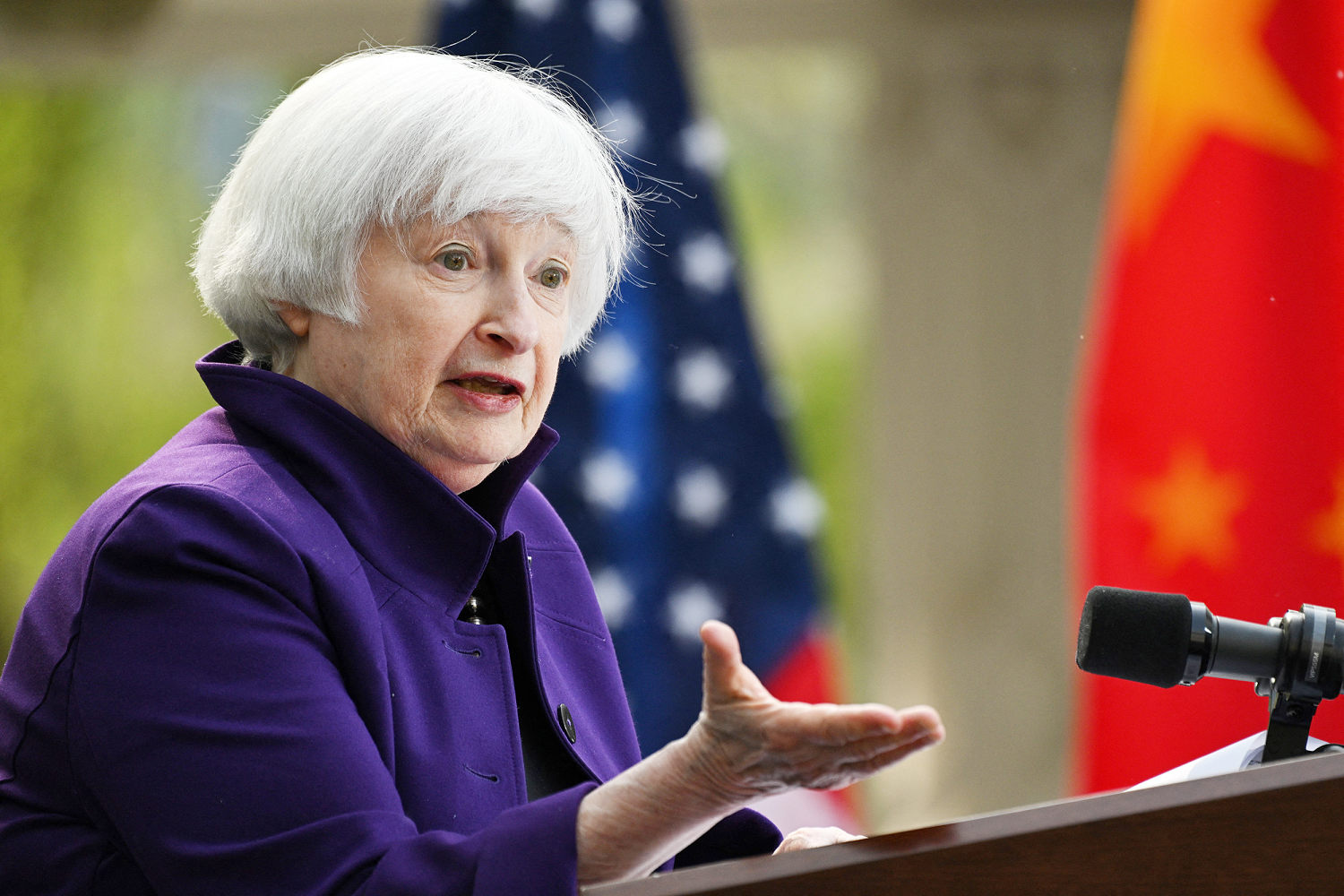Janet Yellen says she won’t rule out possible tariffs on China’s green exports

Treasury Secretary Janet Yellen said Monday that she would not rule out any measures, including potential tariffs, on China’s green energy exports.
“I wouldn’t rule anything out at this point. We need to keep everything on the table. We want to work with the Chinese to see if we can find a solution,” she said in an interview with CNBC’s Sara Eisen, when asked about the possibility of Washington imposing tariffs if China does not adjust its approach to industry incentives.
“I’m not thinking so much of export restrictions, as some shifts in their macroeconomic policy, and a reduction in the amount of, particularly local government subsidies, to firms,” Yellen said.
She nevertheless stressed the need to create a level playing field in the green technology space.
“We just want to make sure that we’re not driven out of business, and that our firms and workers have opportunities in these industries which will be important ones in our future,” she added.
Yellen left Beijing, the Chinese capital, on Tuesday. She arrived in the southern Chinese city of Guangzhou on Thursday last week to connect with Chinese officials as fractious economic relations between the two countries continue.
The U.S. has been increasingly voicing concerns about an oversupply of subsidized Chinese clean energy products — such as solar power, electric vehicles and lithium-ion batteries — that it can export to international markets at discounted prices, which the White House says harms the competitiveness of domestic firms. Washington’s anxiety is shared by U.S. allies including Japan and Europe, as a glut of cheap Chinese products, such as solar panels, has flooded their markets.
“It’s fine for China’s firms to export in this industry, to develop it. But some of the techniques that they use — subsidizing their firms very heavily and then supporting them even when they’re losing money … this is something that’s unacceptable from the U.S. point of view, and many of our allies feel the same way,” Yellen said.
The Treasury secretary said that other countries may also explore the possibility of imposing trade restrictions on China. The European Union is currently conducting an investigation into the possible “dumping” of subsidized Chinese electric vehicles into the region, which risks undermining its sizable automotive industry.
The bloc has so far been resistant to implementing such measures given its strong trade ties with China, the world’s second-largest economy. Speaking on Monday ahead of a three-day trip to China, German Chancellor Olaf Scholz said he was skeptical about the need for tariffs on Chinese EVs, a spokesperson said, according to Reuters.
China’s minister of commerce, Wang Wentao, on Sunday slammed accusations of oversupply by the U.S. and Europe, and said the rise of the country’s EV industry was instead a result of “constant innovations,” according to China’s Ministry of Commerce.
Chinese-built EVs are currently subject to sizable 27.5% tariffs in the U.S. — a policy imposed by former President Donald Trump over concerns around unfair trade practices by Beijing.
The Biden administration had previously considered cutting the tariffs, but Yellen said they were now subject to a review following reports that they may be hiked further amid pressure from Republican lawmakers. China, meanwhile, has called for them to be curtailed.
“[China] have said for a long time that they would like to see them reduced,” Yellen said.
The Commerce Department is investigating whether Chinese EV imports could pose national security risks, particularly given the large amounts of data that “connected” car technologies can collect.
It comes amid growing skepticism around the risks that Chinese technologies pose to U.S. national security. Last month, U.S. lawmakers passed a bill calling for Chinese tech giant ByteDance to divest its popular TikTok social media app in the U.S. or face an effective ban.
Asked whether she thought China would allow the sale of TikTok’s assets to a U.S. company or U.S. investors, Yellen said she did not want to “get ahead” of developments.
“This is an important and profitable company, and I think they’re concerned by the prospect that they would be forced out of the United States,” she said.
Washington has also proposed clamping down on other Chinese firms seen as antithetical to U.S. geopolitical and strategic interests. In particular, the Biden administration has said that it would impose sanctions on Chinese entities found to be aiding Russia’s military and its war efforts in Ukraine.
“What we have made clear is that it is unacceptable to us for China to support Russia militarily. That doesn’t say that China can’t have a relationship…
Read More: Janet Yellen says she won’t rule out possible tariffs on China’s green exports

